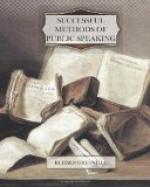to saunter, he debited himself with every minute of
his time; he combined with the highest intellectual
powers the faculty of utilizing them to the fullest
extent by intense application. Moreover, his
industry was prodigious in result, for he was an extraordinarily
rapid worker. Dumont says of Mirabeau, that till
he met that marvelous man he had no idea of how much
could be achieved in a day. “Had I not
lived with him,” he says, “I should not
know what can be accomplished in a day, all that can
be comprest into an interval of twelve hours.
A day was worth more to him than a week or a month
to others.” Many men can be busy for hours
with a mighty small product, but with Mr. Gladstone
every minute was fruitful. That, no doubt, was
largely due to his marvelous powers of concentration.
When he was staying at Dalmeny in 1879 he kindly consented
to sit for his bust. The only difficulty was
that there was no time for sittings. So the sculptor
with his clay model was placed opposite Mr. Gladstone
as he worked, and they spent the mornings together,
Mr. Gladstone writing away, and the clay figure of
himself less than a yard off gradually assuming shape
and form. Anything more distracting I can not
conceive, but it had no effect on the busy patient.
And now let me make a short digression. I saw
recently in your newspapers that there was some complaint
of the manners of the rising generation in Glasgow.
If that be so, they are heedless of Mr. Gladstone’s
example. It might be thought that so impetuous
a temper as his might be occasionally rough or abrupt.
That was not so. His exquisite urbanity was one
of his most conspicuous graces. I do not now
only allude to that grave, old-world courtesy, which
gave so much distinction to his private life; for
his sweetness of manner went far beyond demeanor.
His spoken words, his letters, even when one differed
from him most acutely, were all marked by this special
note. He did not like people to disagree with
him, few people do; but, so far as manner went, it
was more pleasant to disagree with Mr. Gladstone than
to be in agreement with some others.
Lastly, I come to his courage—that perhaps
was his greatest quality, for when he gave his heart
and reason to a cause, he never counted the cost.
Most men are physically brave, and this nation is reputed
to be especially brave, but Mr. Gladstone was brave
among the brave. He had to the end the vitality
of physical courage. When well on in his ninth
decade, well on to ninety, he was knocked over by a
cab, and before the bystanders could rally to his
assistance, he had pursued the cab with a view to
taking its number. He had, too, notoriously, political
courage in a not less degree than Sir Robert Walpole.
We read that George II, who was little given to enthusiasm,
would often cry out, with color flushing into his
cheeks, and tears sometimes in his eyes, and with a
vehement oath:—“He (Walpole) is a
brave fellow; he has more spirit than any man I ever
knew.”




